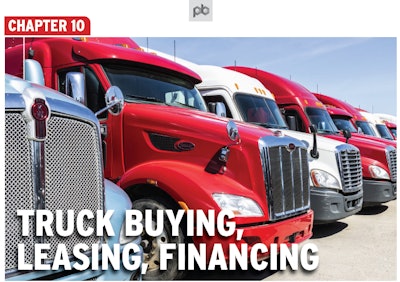There are pros and cons for both purchasing and leasing trucks, as I wrote about several years ago in my buying vs. leasing article. However, for those considering the leasing option, there is a commonly used condition within lease agreements that can be a serious obstacle to overcome.
A significant number of my insurance customers intend to lease their first truck to reduce the initial start-up costs for their new trucking businesses. Most of them are aware that the lease agreement they will sign has certain detailed terms and conditions, which include insurance requirements. However, few are aware of what the exact insurance requirements are and simply assume it’s just a “typical” commercial auto insurance policy. Often, that is not the case.
My own commercial auto policies (trucking policies) have always included coverage for “scheduled autos” as well as other coverages -- cargo, medical payments, physical damage, etc. -- typical for most all independent owner-operators. For a significant number of truck leasing companies these coverages, while necessary, will not meet all the insurance requirements of the lease agreement. Many lease agreements include a requirement to have “any auto” coverage and, sometimes, “hired auto” coverage included on the insurance policy. The majority of insurance companies I am aware of or work with will typically not provide any auto coverage for an independent owner-operator or even small to mid-size fleets.
Because of what any auto coverage is, providing that coverage comes with an enormous risk for the insurance company. Any auto coverage means exactly what it says. It’s easiest for me to explain by using an example:
Let’s say, hypothetically, W. Joel Baker trucking has an insurance policy that includes scheduled auto coverage. When I applied for my insurance I included on my application that I own one truck. That truck is “scheduled” on the policy. I also requested and was provided any auto coverage. Six months later my customer informs me they will need four more trucks to support the increase in loads, and they would like me to provide those four additional trucks. Great, my business is growing! So I get four more trucks. Without me notifying the insurance company, those trucks automatically have applicable coverage without any premium increase because of the any auto coverage I have on this hypothetical insurance policy. So what would stop me from adding 10, 20, 50 trucks or more without paying a single extra penny for my insurance premium? That’s right, absolutely nothing! That’s why it’s very difficult to find an insurance company who is willing to provide any auto coverage.
I know what everyone is asking. Then why would a leasing company require any auto coverage?
I sincerely believe their motivations are mostly well-intended. For example, if the truck you have breaks down they can quickly and easily give you a different truck. Sometimes, the lease will be for different trucks for different days, weeks, months, etc., depending on truck availability. I have seen other cases where I believe the intent is less than ethical. I have seen those same leasing companies offer their own insurance policy that meets the terms of the lease agreement. Of course, those premiums are typically much higher, completely negating any start-up cost savings.
The best way to avoid this challenge is to fully read the lease agreement before you sign it, simply put. Do not take the salesperson’s “word for it.” If you’re still not sure, share the lease agreement with your attorney or your insurance agent. Finally, if the leasing company has trucks available for lease (especially in the box-truck industry) there is a strong probability their lease agreement includes required any auto coverage.
 Find more information about the truck purchase/lease decision in the section devoted to it, Chapter 10, in the Overdrive/ATBS-coproduced "Partners in Business" manual for new and established owner-operators, a comprehensive guide to running a small trucking business. Click here to download the brand-new 2023 edition of the Partners in Business manual free of charge.
Find more information about the truck purchase/lease decision in the section devoted to it, Chapter 10, in the Overdrive/ATBS-coproduced "Partners in Business" manual for new and established owner-operators, a comprehensive guide to running a small trucking business. Click here to download the brand-new 2023 edition of the Partners in Business manual free of charge.
from Overdrive https://ift.tt/EqvLTAh



Sourced by Quik DMV - CADMV fleet registration services. Renew your registration online in only 10 minutes. No DMV visits, no lines, no phone mazes, and no appointments needed. Visit Quik, Click, Pay & Print your registration from home or any local print shop.

No comments:
Post a Comment